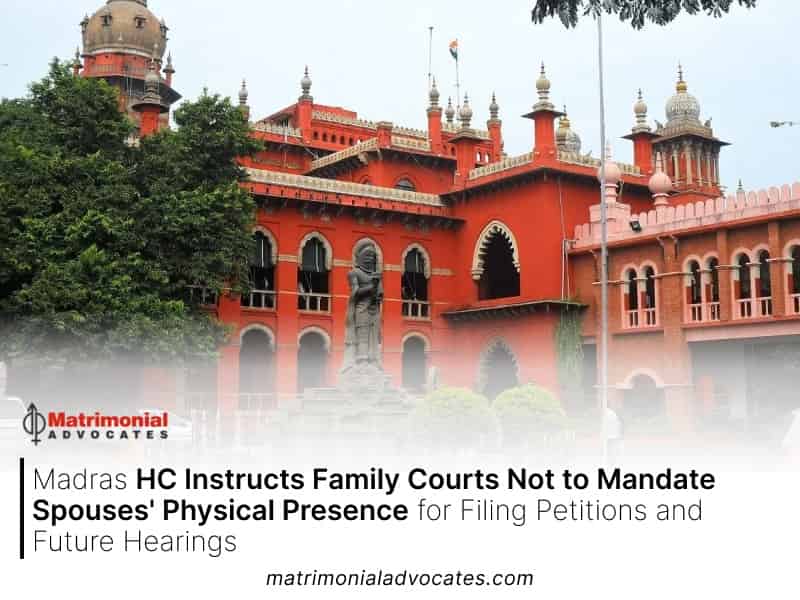
The Madras High Court has directed Family Courts not to mandate the physical presence of spouses when filing a petition for the first time or in future hearings.
This ruling followed a criminal revision petition filed by an estranged wife, requesting the Principal Family Court in Chennai to assign a number to her unnumbered application under Section 13-B of the Hindu Marriage Act, 1955, seeking a mutual consent divorce.
A Single Bench of Justice M. Nirmal Kumar ordered, This Court coming to such finding, the following directions are issued in respect of filing of petitions, hearing the parties, recording of evidence under Order XVIII Rule 4 and allied provisions of C.P.C. in a cases filed under Section 13-B of Hindu Marriage Act:
- The Family Courts henceforth not to insist physical presence of the petitioners/spouses at the time of presenting the petition at the first instance and for future hearings;
- Petitions can be filed either by the parties directly or by the Power of Attorney of the parties, provided, the Power of Attorney to be a registered one or properly adjudicated;
- On behalf of the parties, Power of Attorneys can appear and prosecute. The only embargo is that the recognised agent should not be a legal practitioner;
- The Power of Attorney representing the parties shall present the petition with relevant documents annexed, materials and proof affidavit required for the case in physical form;
- The parties can be present through virtual mode from their respective places and the place of location, identity of the person to be confirmed with relevant documents;
- The Court can verify with the parties appearing through virtual mode as to the petition, proof affidavit, documents produced and record the same as evidence on satisfaction and to pass appropriate orders.
Factual Background
The petitioner explained that her marriage to the respondent was solemnized in 2016 according to Hindu rites and customs, after which they moved to the USA. During their marriage, they faced differences and tried to resolve them but eventually could no longer live together as a couple. Their marriage broke down, and they have been living separately since 2021. Both parties agreed to dissolve the marriage by mutual consent. The petitioner traveled from the USA to Chennai to file the mutual consent divorce petition. However, the respondent, unable to travel to India due to visa renewal issues, filed a petition to be represented by his father, acting as his power of attorney, and sought permission to attend the Family Court proceedings via video-conferencing.
Six months later, the case was set for a hearing in November 2023. However, due to the respondent’s unresolved visa issues, he was unable to travel to India, resulting in the case being postponed to January 2024, and again to February for the same reason. Frustrated by the delays caused by procedural hurdles, the petitioner approached the High Court. The Court allowed the respondent to appear via video conferencing, but all interim applications and the power of attorney were subsequently returned. While the presence of both parties through video conferencing was noted, they were not permitted to submit their evidence as they did not appear through the consulate. As a result, the case was not adjudicated, and its progress stalled, leading to the filing of this petition.
The High Court in the above regard, observed, “The presence of coordinator at the remote site is mandatory, required only when a person accused of an offence is to be examined meaning in criminal cases, coordinator presence is mandatory. As regards other cases, it is not a mandatory requirement for a coordinator in the remote site, more so in cases of divorce by mutual consent.”
The Court noted that virtual proceedings present an opportunity to modernize the legal system, making it more affordable and accessible, and enabling individuals to pursue justice from anywhere in the country or around the world.
“Thus the Family Court to ensure that such a system of conducting the proceedings through video conferencing is put to usage without insisting the presence of petitioner even from the time of first presentation till the conclusion of proceedings. The Family Court henceforth not to raise technical objections and insist on physical appearance of petitioner/parties at any stage”, it added.
The Court stated that in cases filed under Section 13-B of the Hindu Marriage Act for divorce by mutual consent, it must determine whether the couple has separated, if there is no chance of reconciliation, and whether the mutual consent was given voluntarily, without coercion, fraud, or undue influence. These factors can be verified by reviewing the petition and questioning the petitioners, even if they appear through virtual means.
“The role of the Court in dealing with 13-B petition is limited. Hence, this Court finds the technical objections raised by the Principal Family Court, Chennai and not entertaining the petition and plea of the petitioners not proper, unreasonable and unsustainable”, it concluded.
Accordingly, the High Court allowed the petition and issued necessary directions.





